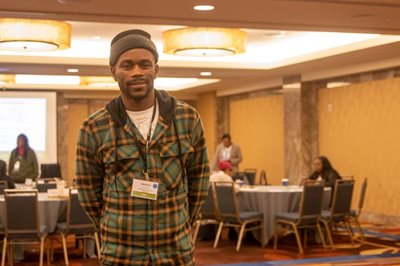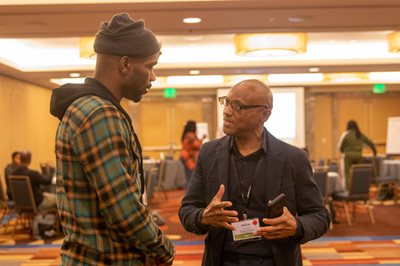Last year, Marcus Harvin had two graduations. The first? With his class at the University of New Haven. The second? With the people with whom he began his journey into higher education: The men imprisoned at MacDougall-Walker Correctional Institute, where Harvin had spent six years, two months and two weeks. He got special permission to go back and join his friends at the prison's graduation last June.
"The same place they strip-searched me is the room where I met the governor," Harvin says.
In part, he returned to see his fellow students who had earned college credits and an associate degree from the University of New Haven. And in part, he wanted to show them that there was hope for them, too. They could move forward. Find a job. Start over.
"I got to hug my best friend again," Harvin says. "When people see you come in and then leave, when they see you walk back out that door, they think, 'That could be me someday.'"
 Harvin, sentenced to prison for driving under the influence, which resulted in an accident, started getting his life together long before he was released from prison. After his release, he found his path forward. His first job after graduation was helping boost the capacity of NHS of New Haven, a NeighborWorks network organization, as a fellow through the University of New Haven. He attended classes at Yale, too, while still imprisoned. When he left the correctional facility, he co-facilitated a class at Yale.
Harvin, sentenced to prison for driving under the influence, which resulted in an accident, started getting his life together long before he was released from prison. After his release, he found his path forward. His first job after graduation was helping boost the capacity of NHS of New Haven, a NeighborWorks network organization, as a fellow through the University of New Haven. He attended classes at Yale, too, while still imprisoned. When he left the correctional facility, he co-facilitated a class at Yale.
"I'm born and raised in New Haven," Harvin says. "Being able to be educated by Yale, especially in prison? How could you say 'no' to that opportunity?"
Several years ago, Harvin had promised his grandmother that he would get his degree, turn things around and even go to law school. Just before she died in 2021, he says, "the opportunity came to make that a reality. I see that as divine opportunity."
The course load was as hard as if he'd been on campus. Harder, in a way, Harvin says, because if there was a lockdown, he couldn't get to class. And he didn't have the internet available to help with homework and research. "You have to do a lot with your head and hands."
Working with his hands, especially, turned out to be something he liked. He discovered that during his time at NHS of New Haven.
Building a foundation
Harvin's work started in the community he'd been born in, Newhallville. He knew people there, says Stephen Cremin-Endes, director of community building and engagement at NHS of New Haven. "He was a perfect match from the first encounter." 
In Newhallville, the network organization has been focusing on housing development work for about a decade. Adam Rawlings, who also works in community engagement and development, relates that one of the first places they placed Harvin was the Ivy Street Garden, near Harvin's church.
Putting his hands in the soil in his community had spiritual meaning. Harvin helped dig and weed and plant. "My mom couldn't believe I was working outside," he recalls. "She said 'I know you've made a change if you're putting your hands in the ground.' But it has that feeling of building a foundation for other people and I liked that."
Adds Rawlings, "Marcus was happy to do the physical work when he felt the connection to the space."
From there, they had Harvin work on the Community Impact Survey, a NeighborWorks program that facilitates the collection of data to tell more of a story about a community. He went door to door to conduct the survey, recruiting members of his church, Pitts Chapel UFWB, and another friend, also recently released from the correctional institution, to ask questions and collect data.
"He pointed out how walking around with a clipboard in hand was not always received well by the community," Rawlings says. Now they carry tote bags, introduce themselves and then reach in to find surveys for the residents.
He also guided NHS of New Haven staff in terms of messaging and language in a letter that explained what the survey was, says Cremin-Endes. "He's highly skilled."
Watching the evolution of resident-driven work
When the summer program ended, the organization got an extension to keep Harvin on board for another month and then another after that. In October, NHS of New Haven brought Harvin to NeighborWorks' Community Leadership Institute (CLI) in San Francisco, California, for leadership training. Cremin-Endes says that when they work with resident-driven groups, their goal is to work with residents for three to four years so they can see the real evolution of their work.
Harvin says he is always hungry for more education. His plan has been to start a ministry -- and he's well on his way -- even as he explores law school and criminal justice. For his team's CLI project, he got consensus to focus on a new food pantry, the brain child of Mother Helen Carr, a church member for 55 years. That's still part of the plan, he says, but they found a different way to get food to residents quickly by working on a food sharing plan.
"It's a really great opportunity for us to implement a CLI passion planning grant to get one year of this running while we look for sponsors and additional grants," Rawlings said of the food pantry idea. "I really see him developing his skill in community organizing and building partnerships. I think he sees this as a complement to the work he'd like to do, too."
Says Harvin, "I used what I learned about the Newhallville community while working with NHS of New Haven to inform my pitch. I explained that I picked up litter from the sidewalks of that community, and that I could tell what the people ingest by what they dispose on the pavement." His conclusion, he says, was that "Newhallville is in fact a food desert, in desperate need of an oasis of sufficient sustenance."
Even as they look into the possibility of a food pantry, Harvin and Rawlings started a food recovery initiative, using funding from NeighborWorks to buy three freezers to help with the effort.
"We said: let’s challenge local universities to give us food waste before they throw it out," he says. "Now we've secured Southern Connnecticut State, Univerity of New Haven and Yale. We package food and we warm it up and deliver it to local warming cneters and shelters. We feed 140-plus people three days a week." In the future, he'd like to partner with the community garden, a group that does a winter coat collection, with job training and health services and more.
"We hope to become a haven for wholeness."
Spotlighting housing opportunities
In addition to talking to community members about food recovery, Harvin talks to them about other things, too, Cremin-Endes says, "challenging residents and saying, 'We have volunteers coming to our community to pick up trash and help out in our community gardens. But this is our neighborhood. All of us need to step up. He's finding more of his voice as he walks and allocates his time in this community."
Meanwhile, he has helped point the spotlight on housing opportunities through NHS of New Haven. Community members are taking homeownership courses and assessing their potential as owners.
NHS of New Haven has a history of working with people who were formerly incarcerated through EMERGE, a social enterprise program that pairs workers with real estate development tasks like property clean-up, demolition work and construction.
Harvin says his faith helps him believe in possibility. "Impossibility does not exist," he says. "I had no doubt I'd come home and do something with my life." His plans are just beginning.
Ultimately, he says, he'd like to see more rebuilding in his neighborhood and beyond. "My plan to rebuild the city of New Haven," he says.
Training and education, including the education he received from NeighborWorks, are both a part of that. "Giving back to my community has always been important to me," Harvin says. "And education? Education is the biggest gap bridge-er there is."
04/16/2024

